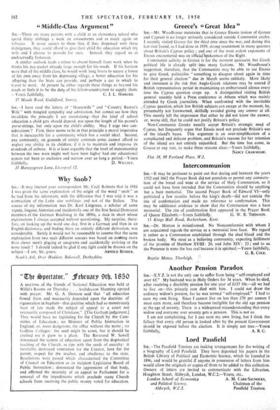Greece's “ Great Idea !) SIR,—Mr. Woodhouse maintains that in Greece
Enosis (union of Greece and Cyprus) is no longer seriously considered outside Communist circles. I recently visited Greece for the third time since the war, and during this last visit found, as I had done in 1939, strong resentment in many quarters about Britain's Cyprus policy ; and one of the most ardent exponents of Enosis encountered was an officiatlipOkesman of the Right.
Communist activity in Greece is for the moment quiescent, but Greek political life is already split' into many factions. Mr. Woodhouse's suggestion, therefore, that the Communists may be able to use Enosis to give Greek -politiciins "something to disagree about again in time for their general election " due in March seems unlikely. More likely and imminent is the risk that Anglo-Greek relations may be soured if British representatives persist in maintaining an embarrassed silence every time the Cyprus question crops up. A distinguished visiting British general recently held a Press conference in Athens which was mainly attended by Greek journalists. When confronted with the inevitable „Cyprus question, which few British subjects can escape at the moment, he, presumably not forewarned, skilfully avoided giving any answer at all This merely left the impression that either he did not know the answer, or, worse still, that he could not justify Britain's policy.
Non-Communist Greeks usually accept Britain's strategic need of Cyprus, but frequently argue that Enosis need not preclude Britain's use of the island's bases. This argument is an over-simplification of a complicated and delicate problem, and Britain's reasons for her retention of the island are not entirely unjustified. But the time has come, in Greece at any rate, to make these reasons clear.—Yours faithfully, Flat 38, 88 Portland Place, W.1.
NANCY CRAWSHAW.


































 Previous page
Previous page